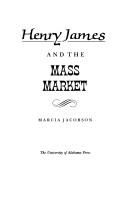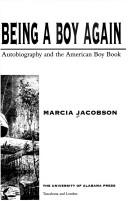| Listing 1 - 2 of 2 |
Sort by
|

ISBN: 0817301453 Year: 1983 Publisher: University University of Alabama Press
Abstract | Keywords | Export | Availability | Bookmark
 Loading...
Loading...Choose an application
- Reference Manager
- EndNote
- RefWorks (Direct export to RefWorks)

ISBN: 0585247161 9780585247168 0817307648 9780817307646 Year: 1994 Publisher: Tuscaloosa : University of Alabama Press,
Abstract | Keywords | Export | Availability | Bookmark
 Loading...
Loading...Choose an application
- Reference Manager
- EndNote
- RefWorks (Direct export to RefWorks)
Marcia Jacobson's Being a Boy Again identifies a literary genre that flourished between the Civil War and World War I - the American boy book. Jacobson distinguishes the boy book tradition from the didactic story for boys and the developmental autobiography of childhood, describing it as an autobiographical form that concentrates on boyhood alone. She discusses what gave rise to the boy book, what forms it took, what problems it addressed, and finally, why it disappeared. Jacobson finds her answers in the widespread social and economic changes of the second half of the 19th century, as well as in the personal crisis that inspired each of the boy books. She argues that key works by such writers as Thomas Bailey Aldrich, William Dean Howells, Mark Twain, Stephen Crane, and Booth Tarkington marked a nostalgic retreat to being a boy again in the face of the difficulties of being a man in 19th-century America. The interplay between the narrating male adult in these books and the child he once was results in wonderfully innovative books - all of which have at their core the narrator's confrontation with his father, the person who should have taught him how to be a man and who inevitably is found wanting. Jacobson concludes her study by looking briefly at the social and intellectual changes that brought the genre to its end. She also suggests that in its rich variety of form and texture, the boy book should be recognized as a precursor of the imaginative autobiography we associate with 20th-century writers.
Autobiographical fiction, American --- American prose literature --- Boys --- Boys in literature. --- Autobiography. --- American autobiographical fiction --- American fiction --- Autobiographies --- Autobiography --- Egodocuments --- Memoirs --- Biography as a literary form --- Children --- Males --- Young men --- American literature --- Male authors --- History and criticism. --- Biography --- History and criticism --- Technique
| Listing 1 - 2 of 2 |
Sort by
|

 Search
Search Feedback
Feedback About UniCat
About UniCat  Help
Help News
News